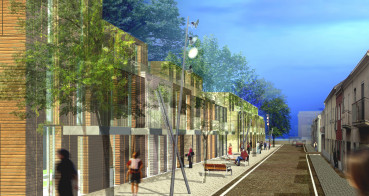objective quality
 Ecology does not admit short cuts, does not admit abbreviated solutions or of convenience, but at least there are two problems with which we must be confronted. One is that of bio-compatibility, that is the problem of health. On the other hand we have the other great line of the eco-sustainability: essentially the intelligent use of materials and energy.
Ecology does not admit short cuts, does not admit abbreviated solutions or of convenience, but at least there are two problems with which we must be confronted. One is that of bio-compatibility, that is the problem of health. On the other hand we have the other great line of the eco-sustainability: essentially the intelligent use of materials and energy.
But to build houses that consume little and do not make people sick is really enough to reach the goal of sustainability? Many ecological buildings will not necessarily return an environment, are not a place, remain anonymous and squalid. Then we have to take another leap: the leap in quality. The question of quality is different parameter from the quantity: in food, dressing, holiday, furnishings, in life. Also because the question of quantity hides a woodworm inside. Each time that we brake down the unit costs, the total costs grow.
The curve of consumption per unit and the curve of global consumption are linked: when one is lowered, the other is raised. The real question is not how much saves a family if it puts photovoltaic on the roof, but what it makes of what it has saved. But fortunately there is another curve, the curve of the perception of well-being, that once satisfied the fundamental needs, appears independent of the consumption.
Only if we manage to combine the scientific capabilities with a strong ethical dimension we are able to promote the environment as home and as a resource for the mankind. But quality does not come even as the sum of quality. A room is not comfortable if your furnitures are exceptional, but if they are well together. Similarly, the buildings do not have to be “beautiful” but they must be good in the place in which they are placed.
The difference in quality between the old towns and the periphery does not lie in the quality of buildings.
This is because the space is “organic”, that is the result of relations between the parts, if only because “to read it” there is the human. But the perception leads to emotions, and these fall under affective sphere. The only hope for the mankind that the projects last over a long time span, is that anybody who will live can establish an affective relationship.
Ugo Sasso
this article was published on the third edition of “Galleria dell’Impegno Etico“ (Ethics Commitment Gallery) 1999 Milan
leggi anche...
ci pregiamo di pubblicare un bell'articolo di Mariangela Martellotta su architet...
Si tratta del primissimo condominio ecologico di edilizia popolare realizzato in...
chi lo ha incontrato non puo' che condividere il nostro pensiero. Per chi ancora...







Leave a Reply